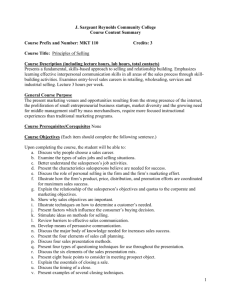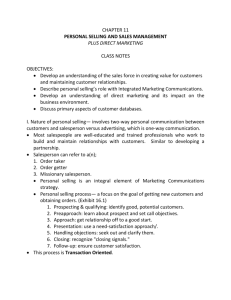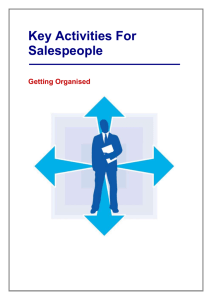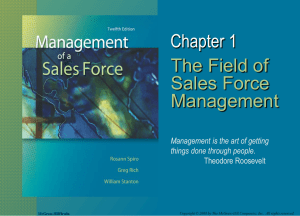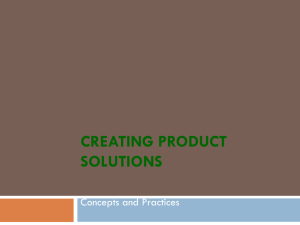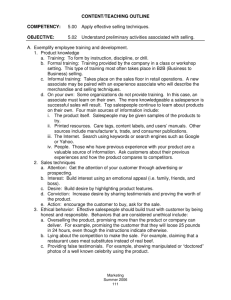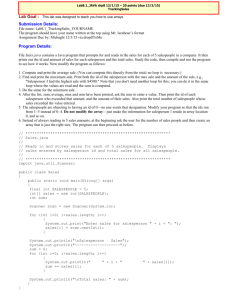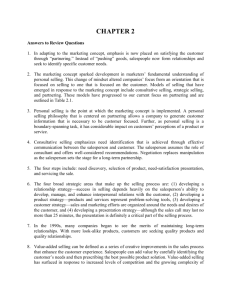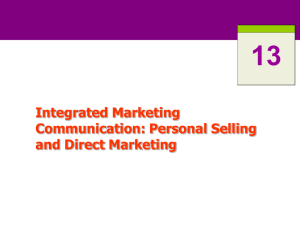Creative Selling .(English)
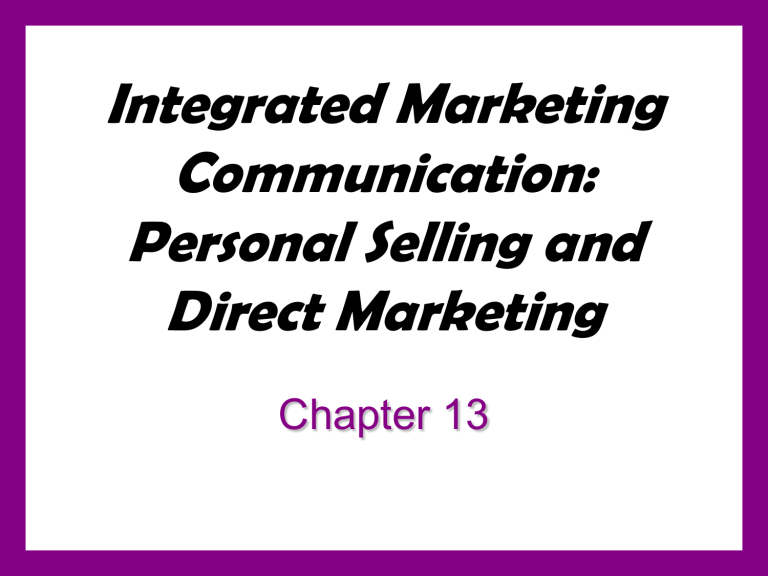
Integrated Marketing
Communication:
Personal Selling and
Direct Marketing
Chapter 13
Road Map: Previewing the
Concepts
• Discuss the role of a company’s salespeople in creating value for customers and building customer relationships.
• Identify and explain the six major sales force management steps.
• Discuss the personal selling process, distinguishing between transactionoriented marketing and relationship marketing.
13 - 2
Road Map: Previewing the
Concepts
• Define direct marketing and discuss its benefits to customers and companies.
• Identify and discuss the major forms of direct marketing.
13 - 3
The Nature of Personal
Selling
• Most salespeople are well-educated, well-trained professionals who work to build and maintain long-term customer relationships.
• The term salesperson covers a wide range of positions:
Order taker: Department store clerk
Order getter: Creative selling in different environments
13 - 4
The Role of the Sales Force
• Personal selling is a paid, personal form of promotion.
• Involves two-way personal communication between salespeople and individual customers.
• Salespeople:
Probe customers to learn about problems
Adjust marketing offers to fit special needs
Negotiate terms of sales
Build long-term personal relationships
13 - 5
The Role of the Sales Force
• Sales Force serves as critical link between company and its customers.
They represent the company to the customers
They represent the customers to the company
Goal = customer satisfaction and company profit
13 - 6
Sale Force Structure
• Territorial : Salesperson assigned to exclusive area and sells full line of products.
• Product : Sales force sells only certain product lines.
• Customer : Sales force organizes along customer or industry lines.
• Complex : Combination of several types of structures.
13 - 7
Inside Sales Force
• Conduct business from their offices via telephone or visits from perspective buyers.
• Includes:
Technical support people
Sales assistants
Telemarketers
13 - 8
Selling Team
• Used to service large, complex accounts.
• Can include experts from different areas of selling firm.
• Pitfalls:
Can confuse or overwhelm customers
Some people have trouble working in teams
Hard to evaluate individual contributions
13 - 9
Recruiting and Selecting
Salespeople
• Key talents of salespeople:
Intrinsic motivation
Disciplined work style
Ability to close a sale
Ability to build relationships with customers
13 - 10
Recruiting Salespeople
• Recommendation s from current sales force
• Employment agencies
• Classified ads
• Web searches
• College students
• Recruit from other companies
13 - 11
Sales Force Training Goals
• Learn about and identify with the company.
• Learn about the company’s products.
• Learn customers’ and competitors’ characteristics.
• Learn how to make effective presentations.
• Learn field procedures and responsibilities.
13 - 12
Compensating Salespeople
• Fixed amount:
Salary
• Variable amount:
Commissions or bonuses
• Expenses:
Repays for job-related expenditures
• Fringe benefits:
Vacations, sick leave, pension, etc.
13 - 13
Supervising Salespeople
• Directing Salespeople
Help them identify customers and set call norms.
Specify time to be spent prospecting
Annual call plan
Time-and-duty analysis
Sales force automation systems
13 - 14
Supervising Salespeople
• Motivating Salespeople
Organizational climate
Sales quotas
Positive incentives:
Sales meetings
Sales contests
Recognition and honors
Cash awards, trips, profit sharing
13 - 15
The Personal Selling Process
• Prospecting: The salesperson identifies qualified potential customers.
• Preapproach: The salesperson learns as much as possible about a prospective customer before making a sales call.
• Approach: The salesperson meets the customer for the first time.
• Presentation: The salesperson tells the “product story” to the buyer, highlighting customer benefits.
13 - 16
The Personal Selling Process
• Handling Objections: The salesperson seeks out, clarifies, and overcomes customer objections to buying.
• Closing: The salesperson asks the customer for an order.
• Follow-up: The salesperson follows up after the sale to ensure customer satisfaction and repeat business.
13 - 17
Direct Marketing
• Direct marketing consists of direct connections with carefully targeted individual consumers to both obtain an immediate response and cultivate lasting customer relationships.
13 - 18
The New Direct-Marketing
Model
• Some firms use direct marketing as a supplemental medium.
• For many companies, direct marketing constitutes a new and complete model for doing business.
• Some firms employ the direct model as their only approach.
• Some see this as the new marketing model of the next millennium.
13 - 19
Benefits of Direct
Marketing
• Benefits to Buyers:
Convenient
Easy to use
Private
Ready access to products and information
Immediate and interactive
13 - 20
Benefits of Direct Marketing
• Benefits to Sellers:
Powerful tool for building customer relationships
Can target small groups or individuals
Can tailor offers to individual needs
Can be timed to reach prospects at just the right moment
Gives access to buyers they could not reach through other channels
Offers a low-cost, efficient way to reach markets
13 - 21
Customer Databases
• An organized collection of comprehensive data about individual customers or prospects, including geographic, demographic, psychographic, and behavioral data.
13 - 22
Telemarketing
• Accounts for more than 36% of all direct-marketing sales.
• Used in both consumer and B2B markets.
• Can be outbound or inbound calls.
13 - 23
Direct-Mail Marketing
• Involves sending an offer, announcement, reminder, or other item to a person at a particular address.
• Accounts for more than 31% of direct-marketing sales.
• Permits high target-market selectivity.
• Personal and flexible.
• Easy to measure results.
13 - 24
Catalog Marketing
• With the Internet, more and more catalogs going electronic.
• Print catalogs still the primary medium.
• Expected sales in 2008 = $176 billion.
• Harder to attract new customers with
Internet catalogs.
13 - 25
Direct Response TV
Marketing
• Direct-response advertising
• Infomercials
• Home shopping channels
13 - 26
Kiosk Marketing
• Information and ordering machines generally found in stores, airports, and other locations.
13 - 27
Public Policy and Ethical
Issues in Direct Marketing
• Irritation to Consumers
• Taking unfair advantage of impulsive or less sophisticated buyers
• Targeting TV-addicted shoppers
• Deception, Fraud
• Invasion of Privacy
13 - 28
Rest Stop: Reviewing the Concepts
1.
Discuss the role of a company’s salespeople in creating value for customers and building customer relationships.
2.
Identify and explain the six major sales force management steps.
3.
Discuss the personal selling process, distinguishing between transaction-oriented marketing and relationship marketing.
13 - 29
Rest Stop: Reviewing the Concepts
4.
Define direct marketing and discuss its benefits to customers and companies.
5.
Identify and discuss the major forms of direct marketing.
13 - 30
